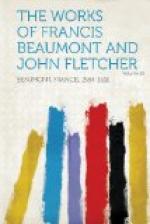Then where am I? but now I’ve
thought upon’t,
I’le prayse thee more then all have ventur’d on’t. I’le take thy noble Work (and like the trade Where for a heap of Salt pure Gold is layd) I’le lay thy Volume, that Huge Tome of wit, About in Ladies Closets, where they sit Enthron’d in their own wills; and if she bee A Laick sister, shee’l straight flie to thee: But if a holy Habit shee have on, Or be some Novice, shee’l scarce looks upon Thy Lines at first; but watch Her then a while, And you shall see Her steale a gentle smile Upon thy Title, put thee neerer yet, Breath on thy Lines a whisper, and then set Her voyce up to the measures; then begin To blesse the houre, and happy state shee’s in. Now shee layes by her Characters, and lookes With a stern eye on all her pretty Bookes. Shee’s now thy Voteresse, and the just Crowne She brings thee with it, is worth half the Towne.
I’le send thee to the Army, they that fight
Will read thy tragedies with some delight, Be all thy Reformadoes, fancy scars, And pay too, in thy speculative wars.
I’le send thy Comick scenes to some of those
That for a great while have plaid fast and loose; New universalists, by changing shapes, Have made with wit and fortune faire escapes.
Then shall the Countrie that poor Tennis-ball
Of angry fate, receive thy Pastorall, And from it learn those melancholy straines Fed the afflicted soules of Primitive swaines. Thus the whole World to reverence will flock Thy Tragick Buskin and thy Comick Stock; And winged fame unto posterity Transmit but onely two, this Age, and Thee.
I’le prayse thee more then all have ventur’d on’t. I’le take thy noble Work (and like the trade Where for a heap of Salt pure Gold is layd) I’le lay thy Volume, that Huge Tome of wit, About in Ladies Closets, where they sit Enthron’d in their own wills; and if she bee A Laick sister, shee’l straight flie to thee: But if a holy Habit shee have on, Or be some Novice, shee’l scarce looks upon Thy Lines at first; but watch Her then a while, And you shall see Her steale a gentle smile Upon thy Title, put thee neerer yet, Breath on thy Lines a whisper, and then set Her voyce up to the measures; then begin To blesse the houre, and happy state shee’s in. Now shee layes by her Characters, and lookes With a stern eye on all her pretty Bookes. Shee’s now thy Voteresse, and the just Crowne She brings thee with it, is worth half the Towne.
I’le send thee to the Army, they that fight
Will read thy tragedies with some delight, Be all thy Reformadoes, fancy scars, And pay too, in thy speculative wars.
I’le send thy Comick scenes to some of those
That for a great while have plaid fast and loose; New universalists, by changing shapes, Have made with wit and fortune faire escapes.
Then shall the Countrie that poor Tennis-ball
Of angry fate, receive thy Pastorall, And from it learn those melancholy straines Fed the afflicted soules of Primitive swaines. Thus the whole World to reverence will flock Thy Tragick Buskin and thy Comick Stock; And winged fame unto posterity Transmit but onely two, this Age, and Thee.
THOMAS
PEYTON.
Agricola
Anglo-Cantianus.
VERSES
ON THE
Deceased Authour, Mr John Fletcher,
his Plays; and especially, The Mad Lover.
Whilst his well organ’d body doth retreat, To its first matter, and the formall heat Triumphant sits in judgement to approve Pieces above our Candour and our love: Such as dare boldly venter to appeare Unto the curious eye, and Criticke eare: Lo the Mad Lover in these various times Is pressed to life, t’ accuse us of our crimes. While Fletcher liv’d, who equall to him writ Such lasting Monuments of naturall wit? Others might draw: their lines with sweat, like those That (with much paines) a Garrison inclose; Whilst his sweet fluent veine did gently runne As uncontrold, and smoothly as the Sun. After his death our Theatres did make Him in his own unequald Language speake: And now when all the Muses out of their Approved modesty silent appeare, This Play of Fletchers braves the envious light As wonder of our eares once, now our sight. Three and fourfold blest Poet, who the Lives Of Poets, and of Theaters survives! A Groome, or Ostler of some wit may bring His Pegasus to the Castalian spring; Boast he a race o’re the Pharsalian plaine, Or happy Tempe valley dares maintaine: Brag at one leape




